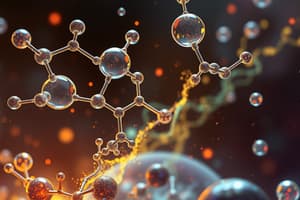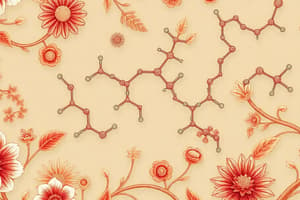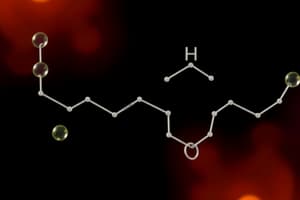Podcast
Questions and Answers
What characteristic of carbon allows the formation of millions of organic compounds?
What characteristic of carbon allows the formation of millions of organic compounds?
- Ability to conduct electricity
- Ability to form ionic bonds with other elements
- Ability to form chains with other carbon atoms (correct)
- Ability to react with oxygen
Which of the following is a universally considered organic compound?
Which of the following is a universally considered organic compound?
- Methane (CH4) (correct)
- Carbon tetrachloride (CCl4)
- Hydrogen cyanide (HCN)
- Carbon dioxide (CO2)
Which of the following compounds is generally considered inorganic for historical reasons?
Which of the following compounds is generally considered inorganic for historical reasons?
- Chloroformic acid (ClCO2H)
- Carbonate ion (CO2−3) (correct)
- Carbon dioxide (CO2)
- Cyanide ion (CN−)
What discipline is concerned with the study of the properties, reactions, and syntheses of organic compounds?
What discipline is concerned with the study of the properties, reactions, and syntheses of organic compounds?
Why is it difficult to provide a rigorous definition of an organic compound?
Why is it difficult to provide a rigorous definition of an organic compound?
Flashcards
Carbon's unique bonding
Carbon's unique bonding
Carbon can form long chains and complex structures with other carbon atoms, creating many organic compounds.
Organic compound example
Organic compound example
Methane (CH4) is a common example of an organic compound recognized by scientists.
Inorganic compound example
Inorganic compound example
Carbonate ion (CO3−2) is generally considered an inorganic compound.
Organic Chemistry focus
Organic Chemistry focus
Signup and view all the flashcards
Defining organic compound challenge
Defining organic compound challenge
Signup and view all the flashcards
Study Notes
Characteristics of Carbon
- Carbon's ability to form long chains and rings, as well as its ability to bond with many other elements, allows the formation of millions of organic compounds.
Classification of Organic Compounds
- Universally considered organic compounds include carbon dioxide (CO2) and urea (CO(NH2)2).
- Cyanide (CN-) is generally considered inorganic for historical reasons, despite containing carbon.
Organic Chemistry
- Organic chemistry is the discipline concerned with the study of the properties, reactions, and syntheses of organic compounds.
Definition of Organic Compounds
- It is difficult to provide a rigorous definition of an organic compound due to the large and diverse range of substances that are considered organic, as well as the historical and cultural contexts that have influenced their classification.
Studying That Suits You
Use AI to generate personalized quizzes and flashcards to suit your learning preferences.
Description
Test your knowledge on the distinction between organic and inorganic compounds, including the role of carbon-containing bonds. Explore the diverse range of chemical compounds and their classification based on carbon content.




